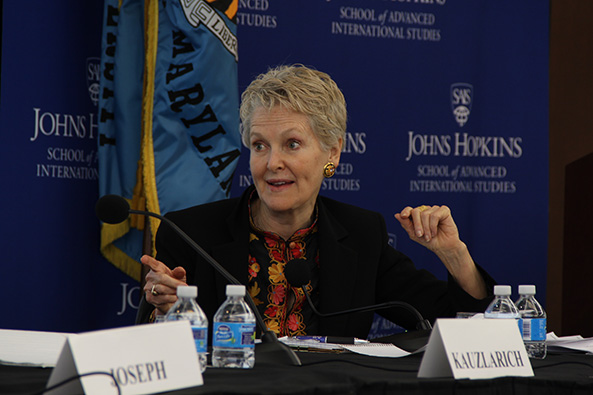 Swanee Hunt, Former Ambassador to Austria
Swanee Hunt, Former Ambassador to Austria
I was driving back from the grocery store this morning and listening to CNN’s Fareed Zakaria GPS show. He had a group discussion that made me wait for the conclusion of the segment before taking my groceries into the house. The topic was international peace negotiations with the lead guest being our former Ambassador to Austria Swanee Hunt. She was discussing a peace negotiation that she had been involved with to bring peace to the Balkans. I was particularly interested in this as I was working with the UNHCR in Croatia during this same time. The negotiations had been very difficult and complicated. When the day came to sign the agreement finally reached she said she looked out at the room filled with men in grey suits and it hit her. Perhaps it was the lack of women at the table that made the negotiations difficult. When she then discussed with women around the world why they were not included she was told that the warlords did not want the women there because they “would be more likely to compromise”. After all the men with the guns had a specific agenda and they wanted to negotiate from a place of power and the women had different priorities.
In fact, the women did have different priorities, and these included peace, security for their children, and the ability to provide their family with stability, education and health care. This is not to say that many men don’t also have these as priorities for their society but the political and military men who were negotiating for land, rights to assets and power were not the men that may have these priorities. The results are that the international negotiations are too often inclusive of only one group, the ones with the guns that benefit from war or at least “power negotiations”. As was discussed in the piece on GPS, this too often make negotiations difficult and the agreements reached tenuous.
The lessons to be learned from this piece struck me hard. Almost all of the negotiations that I am involved in on a daily basis do include women as they mostly involve family negotiations and mediation. However, the participants may approach the negotiation priorities very differently. It is important to ensure that everyone is clear on the goals of a lasting agreement. Also, it is important to ensure that all parties affected by the agreement have a voice at the table. The children are usually not included in the adult negotiations of divorce and sometimes the elder suffering severe dementia or health problems are not included in negotiations that seek to resolve their situation. However, it is often helpful to have a picture of these “parties” present at the negotiations to keep them “present” while we discuss their priorities. In more expansive societal negotiations, whether it be community relations, politics or international peace negotiations, it is critical that we include representatives from all aspects of the society at the table.
For more information on Swanee Hunt and her programs to include women on an international scale, please visit her website https://www.swaneehunt.com/
